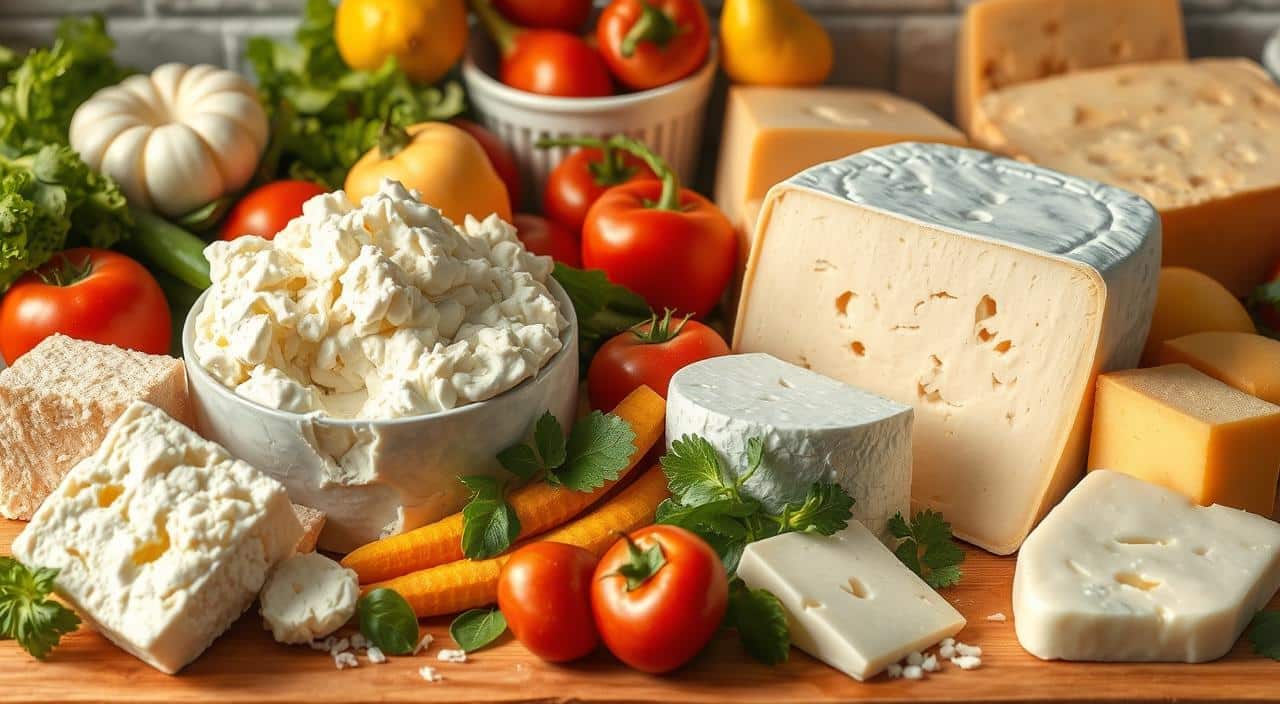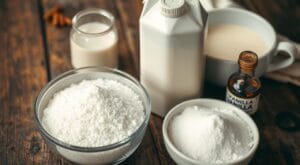Jump to:
Estimated reading time: 8 minutes
Table of contents
Many people are now choosing cottage cheese as a healthier option over traditional cheese. It’s known for its high protein and lower fat and calorie levels. This cottage cheese health comparison will look into whether is cottage cheese better for you than cheese?
We’ll look at the nutritional differences between cottage cheese and regular cheese. We’ll compare their protein, fat, calories, vitamins, and minerals. This can help you decide which is better for a healthy diet.
Is cottage cheese healthier than cheese? We’ll also talk about the health benefits of cottage cheese over regular cheese. These benefits include weight loss, better digestion, and heart health. By the end, you’ll know which option is healthier for your needs and goals.
Key Takeaways
- Cottage cheese is often higher in protein and lower in fat and calories than regular cheese
- The nutritional profile of cottage cheese may offer benefits for weight loss, digestive health, and heart health
- Understanding the differences between cottage cheese and regular cheese can help you make healthier choices
- Both cottage cheese and regular cheese can be part of a balanced diet, but moderation is key
- Consider your individual health goals and dietary needs when choosing between cottage cheese and regular cheese
Nutritional Comparison: Cottage Cheese vs Cheese
Choosing between cottage cheese and regular cheese means looking at their nutritional values. They are both dairy products but have different nutrients. This makes one better for your health goals. Let’s explore the nutritional benefits of cottage cheese and cheese.
Protein Content in Cottage Cheese and Regular Cheese
Cottage cheese and regular cheese have different amounts of protein. Cottage cheese is high in protein, offering about 28 grams per cup. It’s great for athletes, fitness lovers, or those recovering from illness.
Regular cheese also has protein, but the amount changes with the type. For example, a one-ounce piece of cheddar cheese has about 7 grams of protein. Swiss cheese gives you 8 grams in the same size.

Fat and Calorie Differences
Cottage cheese is often lower in fat and calories than regular cheese, especially the low-fat types. A cup of low-fat cottage cheese has about 163 calories and 2.3 grams of fat. It’s a good choice for those watching their calorie or fat intake.
Regular cheese, however, tends to be higher in fat and calories. A one-ounce piece of cheddar cheese has around 114 calories and 9 grams of fat. But, the fat content varies by cheese type, with mozzarella and feta being lower than Brie or Camembert.
Vitamins and Mineral Content
Cottage cheese and regular cheese are both packed with vitamins and minerals. Cottage cheese is high in calcium, with a cup offering about 138 milligrams. It also has a lot of vitamin B12, important for nerve and red blood cells.
Regular cheese is also a calcium powerhouse, with a one-ounce piece of cheddar giving you about 202 milligrams. It’s full of vitamin A, zinc, and phosphorus, which are good for your health.
| Nutrient (per 100g) | Low-fat Cottage Cheese | Cheddar Cheese |
|---|---|---|
| Protein | 12.4g | 24.9g |
| Fat | 1.0g | 33.1g |
| Calcium | 61mg | 721mg |
| Vitamin B12 | 0.7µg | 0.9µg |
Health Benefits of Cottage Cheese vs Cheese
When looking at the health benefits of cottage cheese and regular cheese, there are key differences. Both types of dairy products are good for you but vary in fat content and lactose levels. They also affect weight management and heart health differently.
Weight Loss and Low-Fat Options
For those wanting to lose weight or keep a healthy weight, low-fat cottage cheese is a great pick. It has fewer calories and less fat than most cheeses. This makes it ideal for those watching their weight. The high protein in cottage cheese also helps you feel full, which can help with weight control.
Choosing low-fat or non-fat cottage cheese can help cut down on calories and fat. These types still offer the important nutrients like protein and calcium. But they don’t have the extra calories from fat.
Digestive Health and Lactose Considerations
Lactose, a sugar in milk and dairy, can be a problem for those who are lactose intolerant. Cottage cheese often has less lactose than many cheeses. This is because the lactose is removed during production, along with the whey.
But, the lactose level can change based on the brand and type of cottage cheese. If you’re very lactose intolerant, you might need to be careful or choose lactose-free options.
Impact on Heart Health
The type and amount of fat in cheese affect heart health. Regular cheese, especially high-fat types, can increase heart disease risk if eaten too much. Cottage cheese, especially the low-fat kind, has less saturated fat. This makes it a better choice for heart health.
| Cheese Type | Saturated Fat per 100g |
|---|---|
| Cheddar Cheese | 19.4g |
| Swiss Cheese | 17.4g |
| Mozzarella Cheese | 14.8g |
| Low-Fat Cottage Cheese | 1.2g |
The table shows that low-fat cottage cheese has much less saturated fat than cheeses like cheddar, Swiss, and mozzarella. Adding low-fat cottage cheese to your diet can help your heart by lowering saturated fat intake.
Some cheeses, like certain blue cheeses and feta, might be good for the heart. They could have compounds like CLA and anti-inflammatory factors. But, we need more studies to know how they affect heart health.
Culinary Uses: Cottage Cheese vs Cheese
Cottage cheese and regular cheese are both versatile cheese recipes for many dishes. They can be used in healthy snacks and rich comfort foods. These dairy products offer endless possibilities in the kitchen.
Cottage Cheese in Healthy Recipes
Cottage cheese is great for healthy cottage cheese recipes. It has a mild taste and creamy texture. Use it in salads, dips, and protein-rich snacks. Try mixing it with fresh herbs and veggies for a tasty spread, or as a base for a cheesecake.
Cheese in Traditional Dishes
Regular cheese is key in many traditional cheese dishes, like pasta, pizza, and casseroles. Enjoy these classic dishes in moderation as part of a balanced diet. Choose high-quality cheeses like sharp cheddar, Parmesan, or Gouda for the best taste while using less.
Best Recipes Combining Cottage Cheese and Regular Cheese
Combining cottage cheese and regular cheese makes dishes creamy and packed with protein. Try a lasagna with cottage cheese, mozzarella, and pasta sauce, or a savory dip by blending cottage cheese, cheddar, and spices. This mix gives you cottage cheese’s health benefits and regular cheese’s rich flavor.
| Recipe | Cottage Cheese | Regular Cheese |
|---|---|---|
| Spinach and Cheese Stuffed Chicken Breasts | 1/2 cup low-fat cottage cheese | 1/4 cup shredded mozzarella |
| Broccoli and Cheddar Quiche with Cottage Cheese Crust | 1 cup cottage cheese (for crust) | 1 cup shredded cheddar |
| Creamy Tomato and Cottage Cheese Pasta | 1 cup cottage cheese | 1/4 cup grated Parmesan |
When trying cottage cheese and regular cheese, don’t hesitate to mix and match. These ingredients are versatile, allowing for endless creativity in the kitchen. Whether you want a healthy meal or a comforting treat, you can do it.
FAQ: Frequently Asked Questions About Cottage Cheese vs Cheese
Many people wonder about the nutritional differences and health benefits of cottage cheese and regular cheese. We’ve put together a list of questions to help you understand these two dairy products better.
Is cottage cheese lower in calories than regular cheese?
Cottage cheese usually has fewer calories than most regular cheeses. But, the calories can change based on the type of cottage cheese (like low-fat or full-fat) and the regular cheese variety.
Which has more protein: cottage cheese or regular cheese?
Both cottage cheese and regular cheese are great for protein. Cottage cheese often has more protein per serving than soft cheeses like brie. But, it might have less protein than hard cheeses like cheddar.
Can cottage cheese be used as a substitute for regular cheese in recipes?
Yes, cottage cheese can often replace regular cheese in recipes, especially when you want a creamy texture. But, the taste and melting can be different. So, think about the recipe and what you like best.
Is cottage cheese a good option for those with lactose intolerance?
For some people with lactose intolerance, cottage cheese might be easier to digest than some regular cheeses. But, everyone is different. It’s best to talk to a health expert for advice.
Conclusion: Is Cottage Cheese Healthier than Cheese?
Choosing between cottage cheese and regular cheese can be tough. Both can fit into a healthy diet. Cottage cheese is great for those watching their weight or building muscle because it’s high in protein and low in fat. Regular cheese, however, offers more flavors and textures. It also has important nutrients like calcium and vitamin B12.
When picking a cheese, think about your health goals and what you like to eat. If you want to cut down on fat and calories, go for low-fat cottage cheese or reduced-fat cheeses. If you can’t handle lactose, try aged cheeses like cheddar or Parmesan. Always remember to eat in moderation to keep your diet balanced.
Knowing the nutritional differences between cottage cheese and regular cheese helps you make better choices. It’s important to eat in moderation. Enjoying different cheeses can make your diet more interesting and keep you healthy. So, enjoy your favorite cheeses, but remember the tips from this article to make the best choices.






